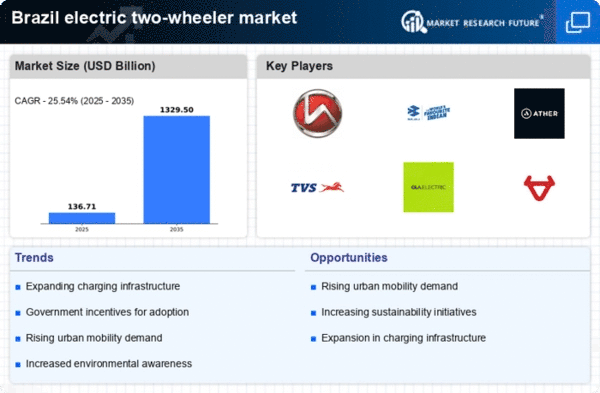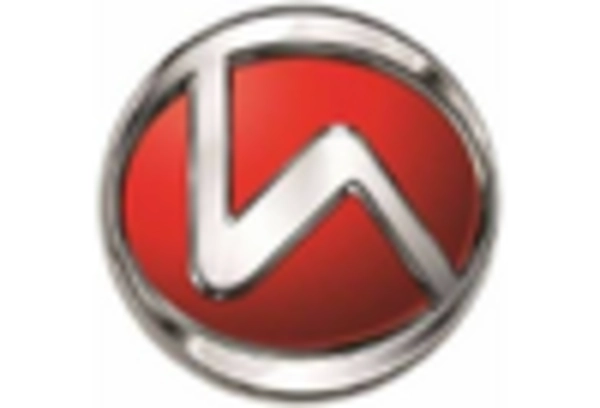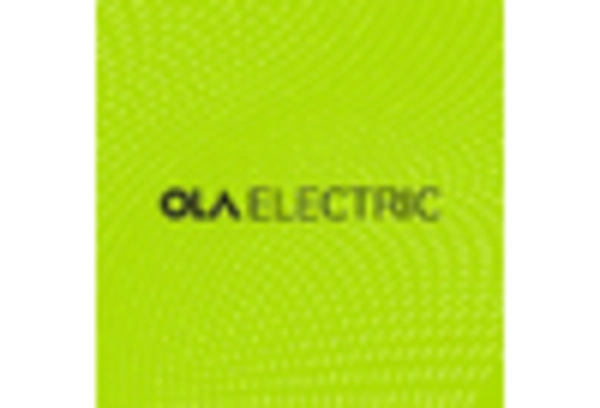Rising Fuel Prices
The escalating prices of fossil fuels in Brazil are driving consumers towards the electric two-wheeler market. As traditional fuel costs continue to rise, the economic appeal of electric two-wheelers becomes more pronounced. With fuel prices increasing by approximately 15% over the past year, many consumers are seeking alternatives that offer lower operational costs. Electric two-wheelers, which can significantly reduce fuel expenses, are becoming an attractive option. This shift is further supported by the fact that electric vehicles generally have lower maintenance costs compared to their gasoline counterparts. Consequently, the rising fuel prices are likely to propel the demand for electric two-wheelers, making them a more viable choice for daily commuting and leisure activities in Brazil.
Urbanization and Traffic Congestion
Brazil is experiencing rapid urbanization, with more people moving to cities. This trend is contributing to increased traffic congestion, which in turn is fostering interest in the electric two-wheeler market. As urban areas become more densely populated, the need for efficient and agile transportation solutions becomes critical. Electric two-wheelers offer a practical alternative, allowing users to navigate through congested streets with ease. Moreover, the compact size of these vehicles makes parking more convenient, addressing another urban challenge. According to recent data, urban areas in Brazil have seen a 20% increase in traffic congestion over the last five years, highlighting the necessity for innovative transportation solutions. Thus, urbanization is likely to continue driving the growth of the electric two-wheeler market.
Environmental Concerns and Sustainability
Growing environmental awareness among Brazilian consumers is significantly influencing the electric two-wheeler market. As concerns about air pollution and climate change intensify, more individuals are seeking sustainable transportation options. Electric two-wheelers produce zero tailpipe emissions, making them an appealing choice for environmentally conscious consumers. Recent surveys indicate that approximately 70% of Brazilians are willing to consider electric vehicles as a means to reduce their carbon footprint. This shift in consumer mindset is likely to bolster the electric two-wheeler market, as manufacturers respond to the demand for greener alternatives. Furthermore, the Brazilian government has been promoting sustainability initiatives, which may further enhance the appeal of electric two-wheelers as a responsible choice for transportation.
Technological Innovations in Battery Technology
Advancements in battery technology are playing a crucial role in the growth of the electric two-wheeler market. Innovations such as improved energy density and faster charging capabilities are making electric two-wheelers more appealing to consumers. In Brazil, the introduction of lithium-ion batteries has led to a significant increase in the range and efficiency of electric two-wheelers. Recent developments suggest that new battery technologies could enhance the range of electric two-wheelers by up to 30%, addressing one of the primary concerns of potential buyers. As battery technology continues to evolve, it is likely to enhance the overall user experience, making electric two-wheelers a more attractive option for daily commuting and recreational use.
Government Support for Infrastructure Development
The Brazilian government is increasingly investing in infrastructure to support the electric two-wheeler market. Initiatives aimed at expanding charging station networks are crucial for encouraging the adoption of electric vehicles. Recent reports indicate that the government plans to increase the number of public charging stations by 50% over the next three years. This expansion is expected to alleviate range anxiety among potential users, making electric two-wheelers a more feasible option for everyday use. Additionally, the development of dedicated lanes for electric two-wheelers could further enhance their appeal, promoting a shift towards more sustainable transportation solutions. As infrastructure improves, the electric two-wheeler market is likely to experience accelerated growth.
















